Cleaning your bird’s cage is key to keeping your pet healthy and happy. A clean cage stops bad smells and lowers the risk of bacteria, mold, and parasites.
Birds spend most of their time in their cages, so a fresh environment is vital for their health and comfort. This guide will show you the best ways to clean your bird’s cage effectively.
Whether you’re a new owner or experienced caretaker, these tips will help you create a safe and cheerful home for your bird.
Gather Your Supplies
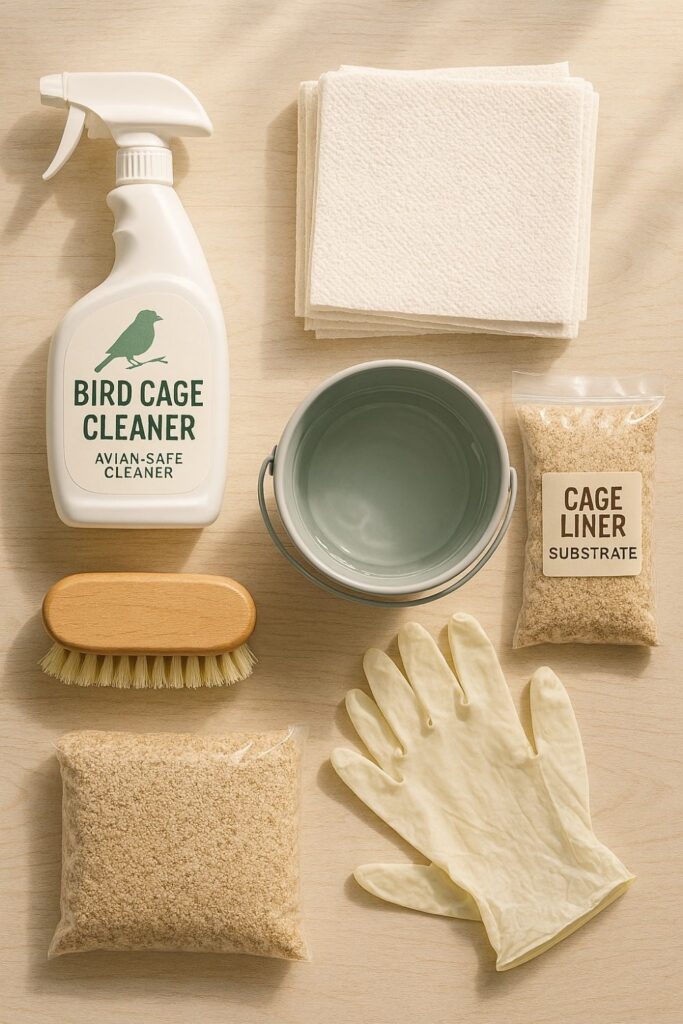
Before you clean your bird’s cage, gather your supplies. You’ll need a scrub brush, mild soap, and a bucket of water. Having these ready makes cleaning easier and quicker.
Make sure to have a backup cage or safe space for your bird while you clean. This keeps your bird safe and stress-free. A travel cage or play gym works well for this.
Use a mix of mild soap and water to clean the cage. Avoid harsh chemicals; they can harm your bird. Rinse all soap completely to prevent any residue that could affect your pet’s health.
Discover top bird cage cleaning tools available now on Amazon
Remove the Bird
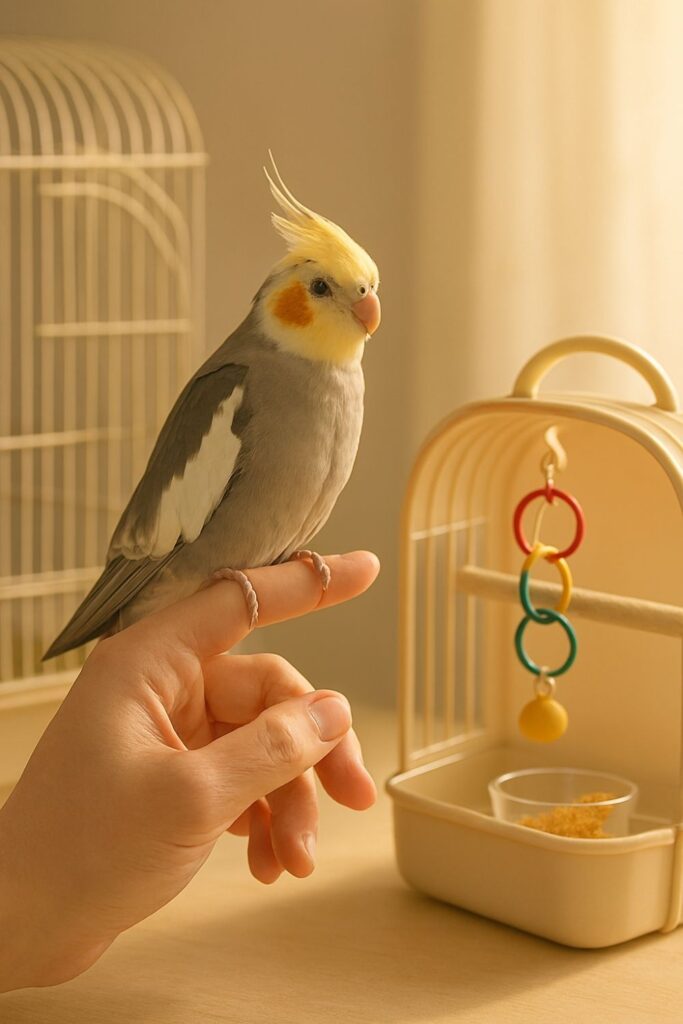
When cleaning your bird’s cage, first take them out. Place them in a safe spot, like another cage or a secure room. This keeps them from flying away or getting hurt.
Make the temporary space comfortable. Include food, water, and a few toys to keep them entertained while you clean.
Always handle your bird gently. Speak calmly and move slowly. This helps them feel safe during the transfer.
Clean the Cage Accessories
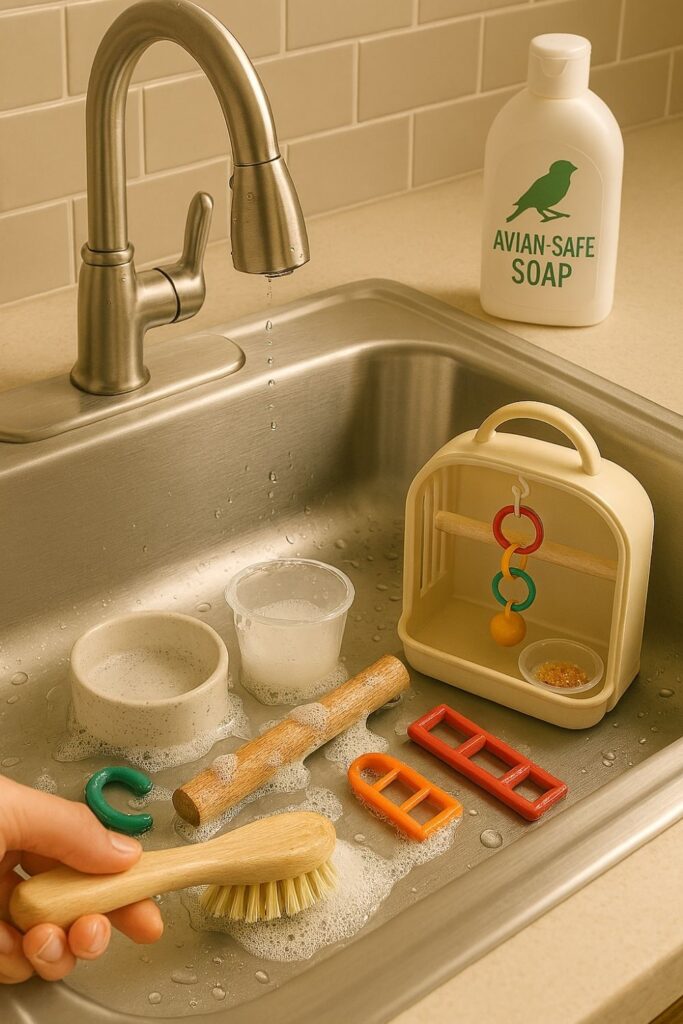
Remove all toys, perches, and food dishes from the bird’s cage. These can collect dust and dirt, harming your bird’s health. Clean them regularly with safe products to keep a healthy environment.
Use bird-safe cleaners for the accessories. Avoid harsh chemicals that can harm your bird. Warm water and mild soap usually work well. Rinse everything thoroughly and let them dry completely before putting them back in the cage.
Clean the food and water dishes daily. Birds can be messy eaters, and leftover food spoils quickly, attracting bacteria. Keeping these dishes clean supports your bird’s health and well-being.
Keep your pet happy with these Amazon-recommended cleaning products
Scrub the Cage
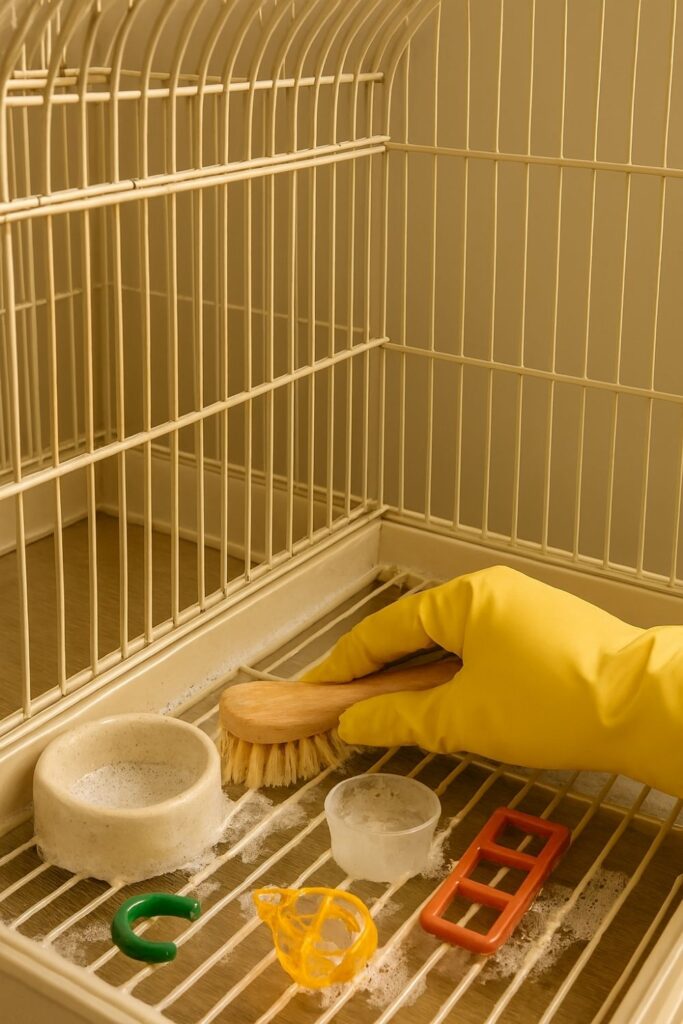
Use a brush and bird-safe cleaner to scrub the cage bars, bottom tray, and surfaces. This removes dirt, droppings, and bacteria, creating a healthier home for your bird.
Cleaning your bird’s cage often lowers disease risk and boosts your pet’s well-being. Scrub all corners and hard-to-reach spots for a complete clean.
After scrubbing, rinse all cage parts with clean water. This removes soap or cleaner residue, ensuring no harmful chemicals are left behind. Keep your bird safe and healthy.
Rinse and Dry
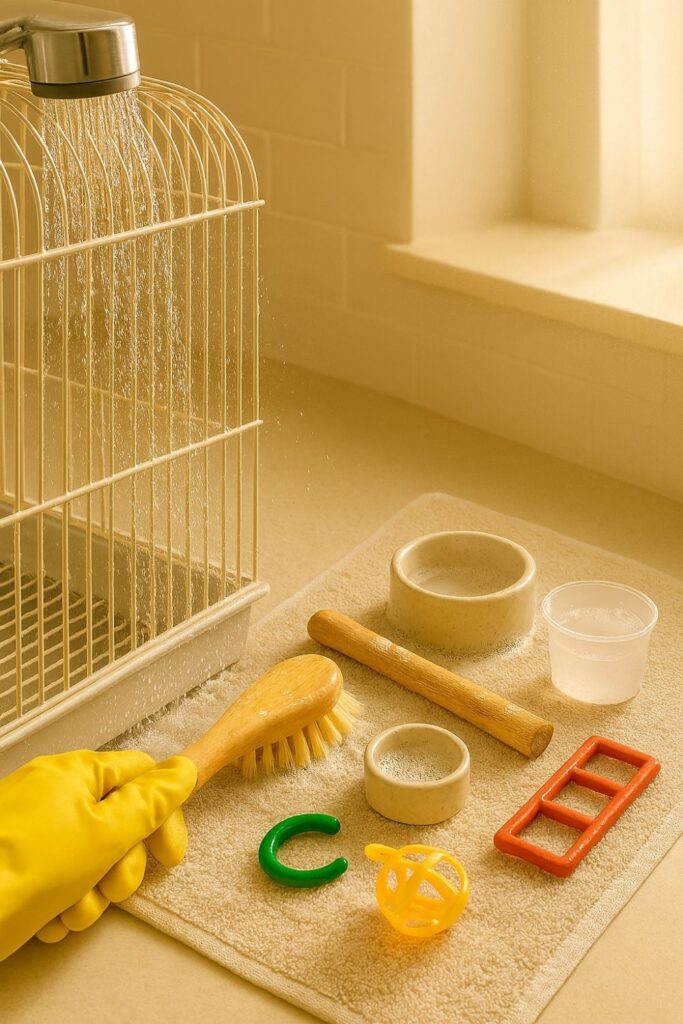
After scrubbing, rinse the bird’s cage well. Leftover soap can harm your bird, so use plenty of water to wash everything off.
Once rinsed, let the cage air dry completely before putting your bird back inside. This helps prevent moisture-related issues that could affect your bird’s health.
Make sure the cage is fully dry. A damp environment can lead to mold growth. Allow enough time for it to dry naturally to keep your bird safe and clean.
Shop the best cage care essentials today on Amazon
Reassemble the Cage
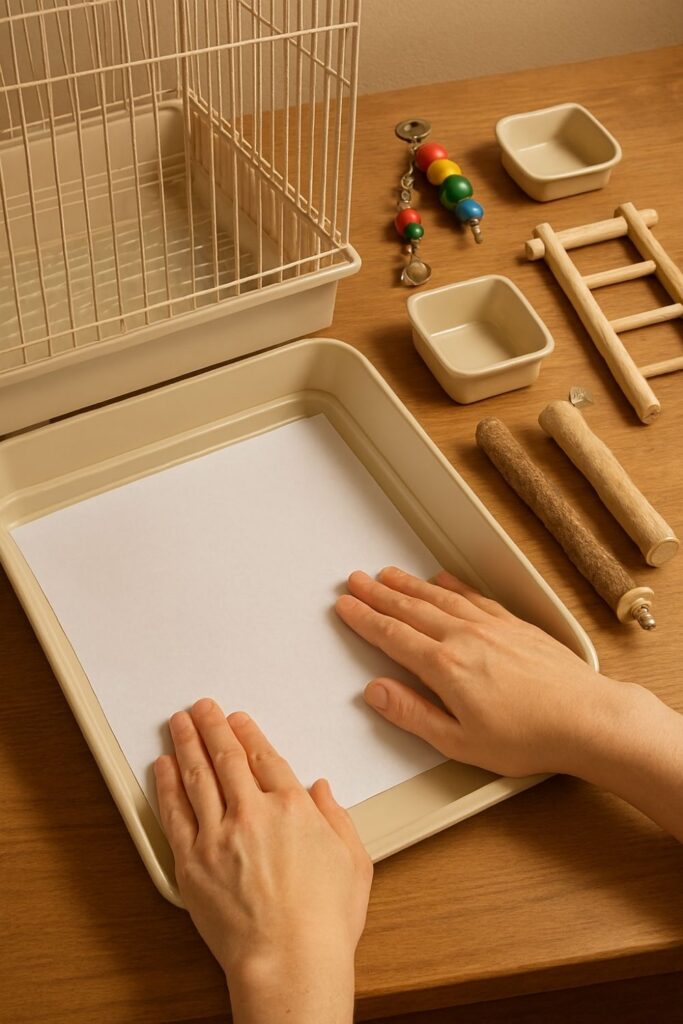
Once everything is dry, start reassembling the cage. Ensure all parts fit correctly and securely. Double-check that accessories, like perches and toys, are clean and dry before returning them.
When putting the cage back together, place accessories in their original spots. This makes your bird feel comfortable and reduces stress. Look for any broken or damaged items and replace anything unsafe for your bird.
Lastly, make sure the cage is stable and all parts are locked in place. This keeps your bird safe and prevents escapes. Regularly check the cage to maintain a clean and safe environment for your pet.
Return the Bird
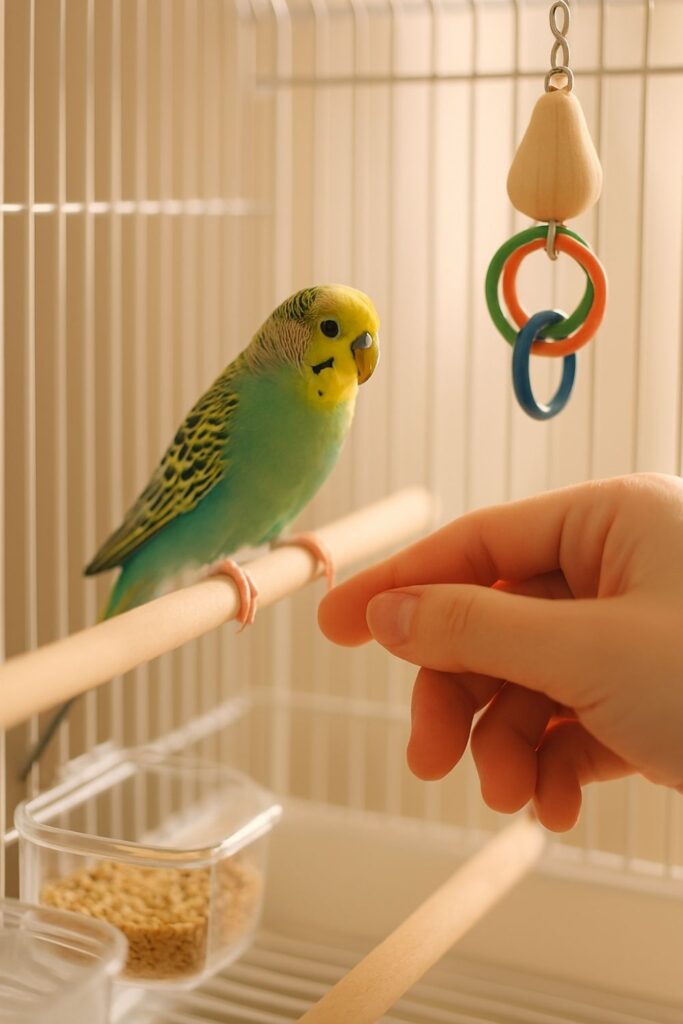
Once the cage is clean, gently put your bird back inside. Make sure it feels safe and comfortable. This builds trust and helps your bird feel secure.
Check that all toys and perches are in place before returning your bird. A familiar setup reduces stress and helps your bird settle quickly.
Watch your bird for a few minutes after you return it to the cage. This ensures it is comfortable and everything is right for its well-being.
Maintain Regular Cleanings
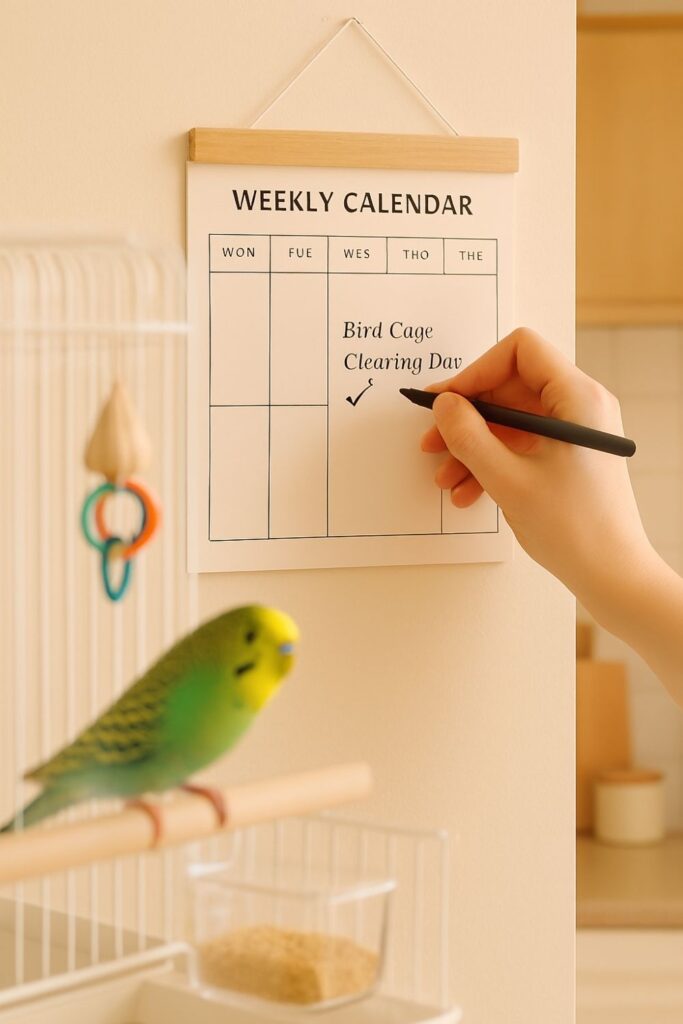
It’s important to establish a routine for cleaning your bird’s cage. This keeps the space hygienic and lowers the risk of diseases. Clean the cage floor daily and change the lining to provide a healthy environment.
Scrubbing the cage bars and perches regularly prevents dirt and germs from building up. Use a bird-safe cleaning solution and rinse well. This gives your bird a clean area to move and stay healthy.
Also, clean the food and water dishes every day. Old food and dirty water can grow bacteria, making your bird sick. Keeping these dishes clean ensures your bird has fresh food and water.
Conclusion
Keeping your bird’s cage clean is key to their health and happiness. Follow these simple steps to create a safe and spotless environment. Regular cleaning helps your pet and keeps your home fresh and odor-free.
How Often Should I Clean My Bird’s Cage?
Clean your bird’s cage daily. Remove droppings, uneaten food, and debris. This keeps the cage hygienic and prevents bacteria or mold.
A thorough cleaning, which includes scrubbing perches, bars, and accessories, should happen weekly. Sticking to this schedule keeps your bird healthy and cuts down on bad odors.
Can I Use Vinegar To Clean My Bird’s Cage?
Yes, you can use diluted white vinegar as a natural cleaner. Mix equal parts vinegar and water for a safe, non-toxic solution.
Rinse the cage well after using vinegar to remove any smell or residue that might bother your bird.
What Cleaning Products Are Safe For Birds?
Bird-safe cleaning products are free from harsh chemicals, bleach, and strong fragrances.
Mild dish soap, diluted vinegar, or pet-safe cleaners are best. Always rinse thoroughly to remove all traces of the cleaner. Birds are sensitive to residues that could harm their health.
How Do I Keep My Bird Safe While Cleaning the Cage?
Place your bird in a separate, secure cage or play gym while cleaning. Make sure they have food, water, and toys to keep them occupied.
Avoid cleaning around your bird, as fumes or splashes from cleaning products can harm them.
Why Is It Important To Dry the Cage Completely?
A damp cage can lead to mold and bacteria. This can harm your bird’s skin and lungs. Make sure to air-dry the cage completely.
This keeps it safe for your bird. Don’t place your bird back inside until everything is fully dry.
